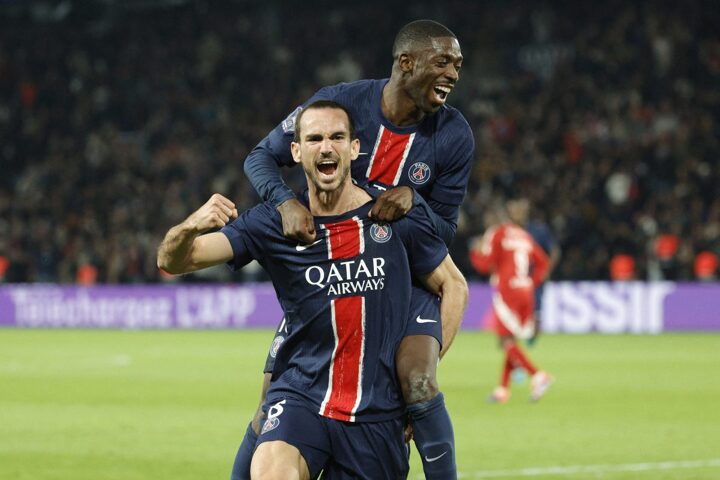Paris Saint-Germain brought down the curtain on Ligue 1 2024 when they defeated AS Monaco in a thrilling 4-2 victory last week. And after a weekend full of Coupe de France matches, the winter break has now officially started, giving us the perfect opportunity to look back on some of the lessons we've learned from (almost) half a season.
There were more than a few question marks hanging over PSG ahead of this season. An era of superstardom came to an extended end in the summer with the acrimonious departure of Kylian Mbappe, and the club was now fully committed to a project that embraced youth development.
A sign of this was that the club passed up the opportunity to secure Victor Osimhen and instead brought in players like João Neves and Désiré Doué. Two young talents who, although expensively acquired, have not yet reached their peak and have room to grow and develop.
Some teething problems were expected for the 2024/25 season as Mbappe was heavily relied upon during his time in the capital. He was the club's most consistent goal threat and top scorer in Ligue 1 over the past six seasons, and the truth was that it seemed like the club had done very little to address his departure.
In the 2023/24 season, apart from Mbappé, only Gonçalo Ramos reached double figures for goals. However, Luis Enrique was not worried and emphasized that the team would be a much closer unit this season.
At least in his own country, the former head coach of Spain and Barcelona has been proven right. The goals came from all corners of the pitch: 44 were scored in sixteen matches in Ligue 1, a record that easily surpasses the next highest scorer Olympique de Marseille, who scored 32 goals in 15 matches. Players like Bradley Barcola (ten goals) and Ousmane Dembélé (eight goals) have stepped up in Mbappé's absence and are second and fourth in the goalscoring charts.
And perhaps most impressive of all is that PSG go into the winter break unbeaten in the league and with a ten-point lead between Marseille (a game in hand) and Monaco.
If PSG's relative lack of shortcomings has dampened hopes of a title race, it is the shortcomings of the chasing pack that look set to shape a very exciting race for Europe. Last season saw a dramatic battle for qualifying spots that lasted until the last day of the season, and it looks like we could witness a similar scenario in 2025 as just six points separate second-placed Marseille from RC Lens in the seventh place.
At the start of the campaign, Marseille and Monaco had briefly looked at a three-way match at the top of the table with Les Parisiens. However, both clubs have struggled with the consistency required to dethrone PSG, allowing the likes of Lens, Olympique Lyonnais and Lille OSC to push forward and close the gap.
Roberto De Zebri from Marseille is struggling to turn the Stade Vélodrome into a fortress. The pressure cooker's home ground have recorded just two wins this season, with Les Phocéens instead getting carried away with their impressive away form – in stark contrast to the previous season, when Marseille won just five games on their travels.
Monaco has had a bad end to the year with only three wins in the last eight games. Head coach Adi Hütter has had to deal with a slew of recent injuries to key players such as Folarin Balogun, Radoslaw Majecki and captain Denis Zakaria, leaving the club looking far less imperious than at the start of the season.
It is these weaknesses that allow the teams below Marseille and Monaco to feel blood and try to force their way into one of the automatic Champions League places.
The summer fiasco, which saw Ligue 1 broadcast rights for the 2024-2029 cycle only agreed a month before the start of the new season, exposed a clear fault line running through the rankings.
According to L'Équipe, just under half of the teams in Ligue 1 were at risk of bankruptcy if an agreement could not be reached this summer: with AJ Auxerre, RC Lens, FC Nantes, Stade de Reims, Stade Brestois, Le Havre AC, and Angers SCO are under threat.
While four clubs, Reims, Angers, Le Havre and Montpellier HSC, could not spend a single euro on transfer fees. Unsurprisingly, of the teams unable to invest, none are in the top half of the table and only Reims (10th) appears safe from relegation.
The financial inequality at the heart of French football has been evident for a number of seasons, but it took poor governance for the fault lines to really become visible. It's hard to see any way the league can cover up these cracks, even though disaster was narrowly avoided with the broadcast deal between DAZN and beIN Sports. The question now is: are we looking at the start of a very different Ligue 1, born from a crack in the composition?
GFFN | Nick Hartland
